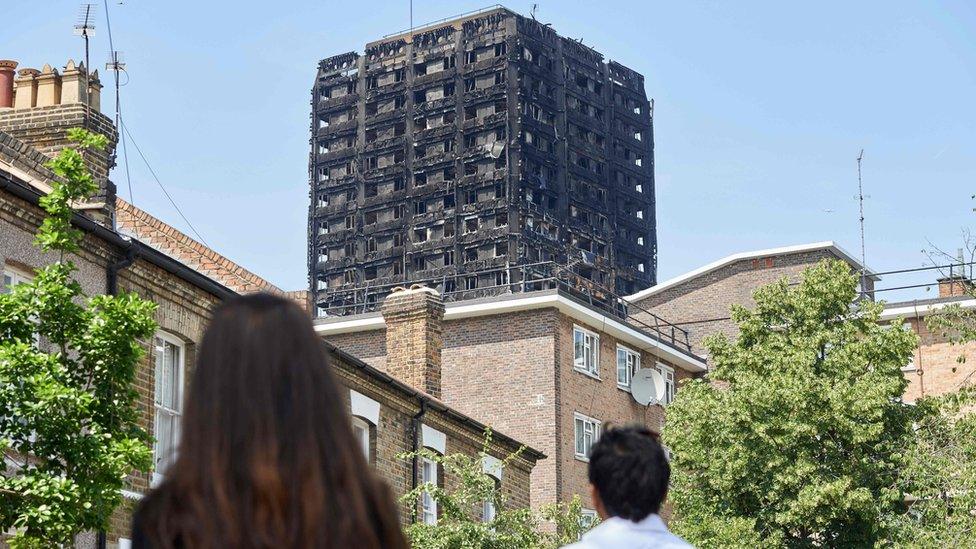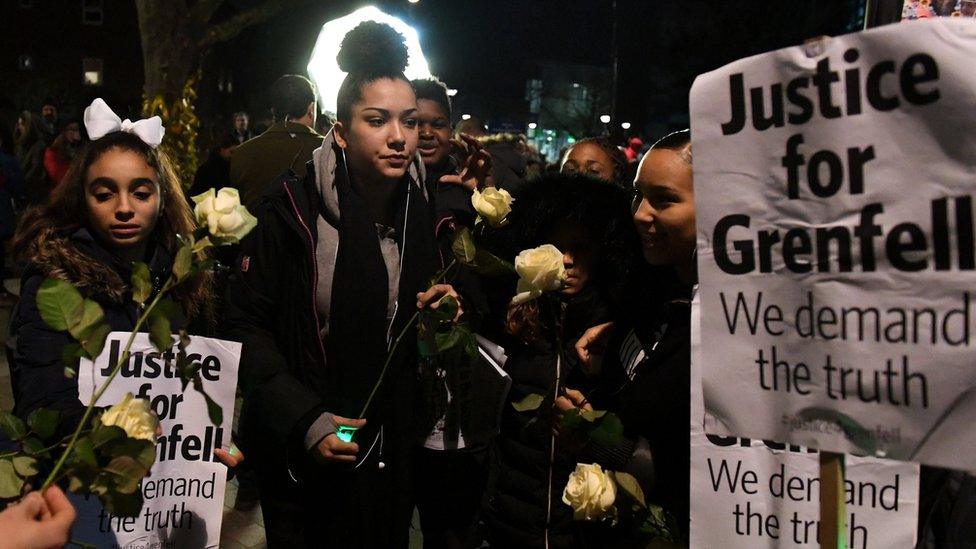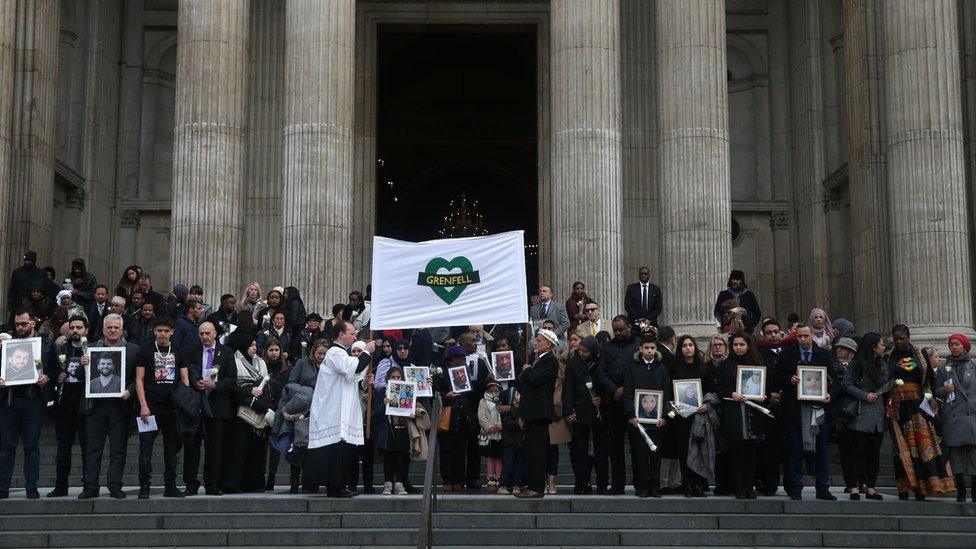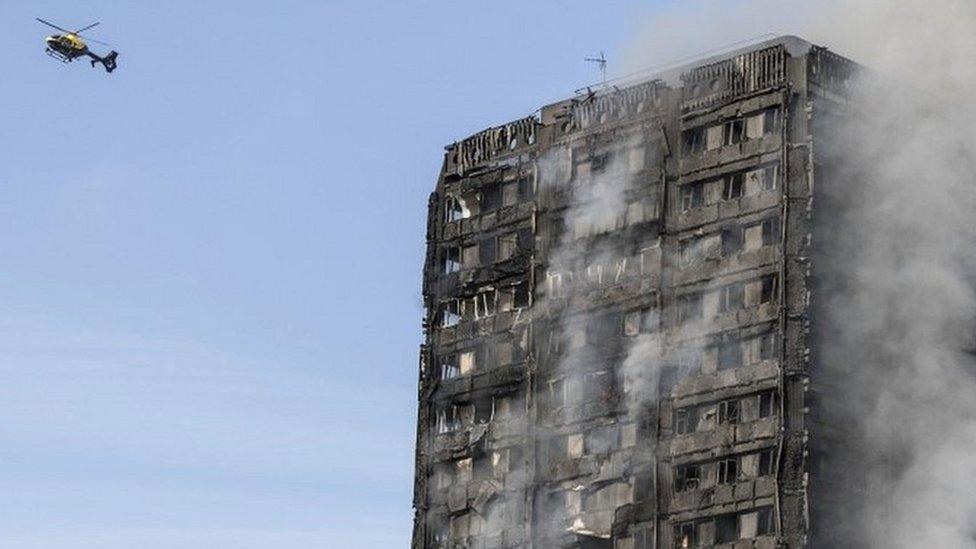Grenfell Tower fire: safety rules failing, says review
- Published

The Grenfell Tower fire claimed the lives of 71 people in June 2017
Building regulations are leaving room for shortcuts, the woman leading a review into fire safety after the Grenfell Tower blaze has said.
In her interim report, external, Dame Judith Hackitt said she was "shocked" by some of the practices she had seen, calling for better enforcement to "hold to account those who try to cut corners."
She said a "cultural change" was needed instead of "doing things cheaply".
The government says it accepts all of the report's recommendations.
The independent review follows the 14 June fire, which killed 71 people.
A final report is expected in spring next year.
Dame Judith's report said the fire in the west London block - in which many people also lost their homes - "should not have happened in our country in the 21st century".
Her review is aimed at making sure similar events do not happen in the future, rather than investigating the specific circumstances at Grenfell.
She said the whole system of fire safety regulation regarding complex and high-rise buildings was "not fit for purpose", and left room for those who wanted to take shortcuts to do so.
She called for a whole new system of enforcement and regulation for high-rise and complex buildings.
But she added this did not mean buildings were unsafe, with major building failures "very rare" and many people in the housing system doing the right thing.

The six-month anniversary of the Grenfell Tower fire was marked earlier this month with a silent candlelit march
Key problems Dame Judith found included regulations that were too complex and unclear; a lack of clarity about roles in design, construction and maintenance and a lack of a clear system to help residents raise concerns.
Interim recommendations included:
An overhaul of the "Approved Documents" in building regulations
An accreditation system to ensure competence for people working on the design, construction, inspection and maintenance of complex buildings are suitably qualified
Better consultation with fire services when designing buildings
Building developers to ensure formal handover process for any new high-rise residential building before occupation
More done to make sure that fire safety information is passed to the person responsible for running the building once it has been constructed
Fire risk assessments are carried out at least annually
Desktop studies to approve changes to cladding should be used only where appropriate and with sufficient, relevant test evidence. The cladding on the Grenfell tower is thought to have contributed to the spread of the fire
'Assurance to residents'
Dame Judith said a "tremendous amount of work" had been done by central government and the fire and rescue service since Grenfell to reassure residents.
But she called for a culture change across the entire industry and those parts of government that oversee it.

A national memorial service was also held at St Paul's Cathedral
Although separate from the public inquiry into the tragedy, being headed by Sir Martin Moore-Bick, the review will run in parallel and add to his inquiry where it can.
In a statement to MPs, Secretary of State for Communities and Local Government Sajid Javid said the government agreed there was a need for a change in culture and a more effective system "to encourage people to do the right thing and hold to account those who try to cut corners".
He added: "We fully support this direction of travel that has been signalled in Dame Judith's report.
"Achieving cultural change will inevitably take time, but while Dame Judith explores these issues further, she has also identified a number of areas where we can make a start today."
He went on to discuss measures that the government has already taken. "While Dame Judith continues her vital work, we are continuing to support wider work to make existing buildings safer," he said.
"In the past six months, we have overseen a comprehensive set of fire safety tests on cladding components and systems," he said, adding that fire services had now inspected every residential tower block thought to be at risk.
But Labour said the recommendations should have been implemented after a fire at Lakanal House, south London, in 2009, which left six dead.
Shadow housing secretary John Healey said ministers had to start acting on existing recommendations immediately, rather than waiting for the final Hackitt report.
Lord Gary Porter, chairman of the Local Government Association, said the report "reinforces our warnings about the complexity and confusion in the current system".
He said the government should take action straightaway to work with councils and the industry to take the process of reform forward.
Dame Judith is due appear in front of the Commons' local government committee to discuss the report.
- Published24 November 2017

- Published10 December 2017

- Published16 November 2017
